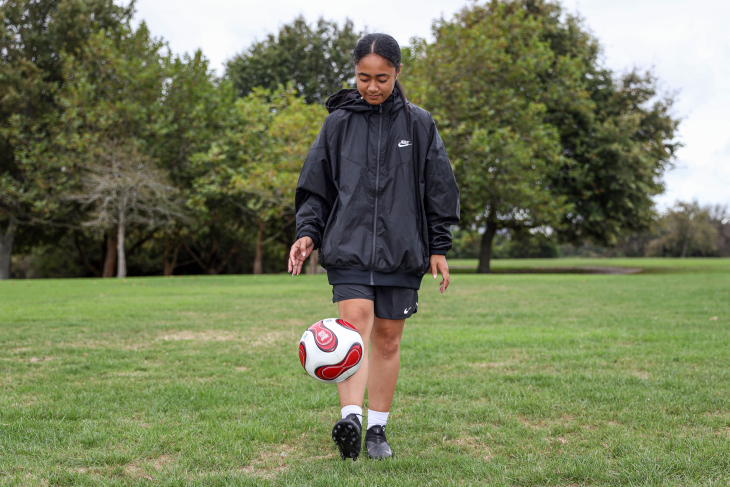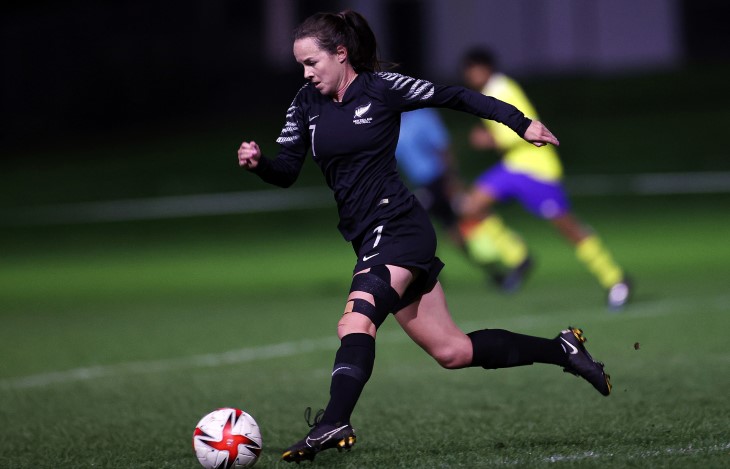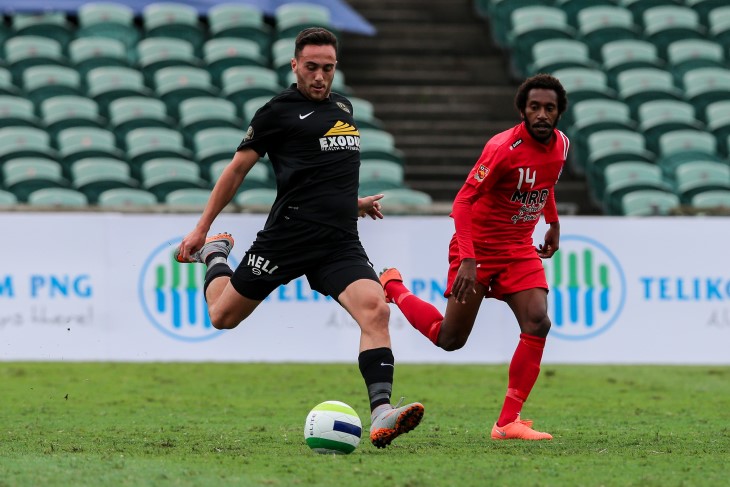Carla’s story: New treatment pathway helps sports-mad teen bounce back Te kōrero a Carla: He ara whakamaimoa hou hei whakapiki ake te ora o te hunga rangatahi e tino ngākaunui ana ki te hākinakina
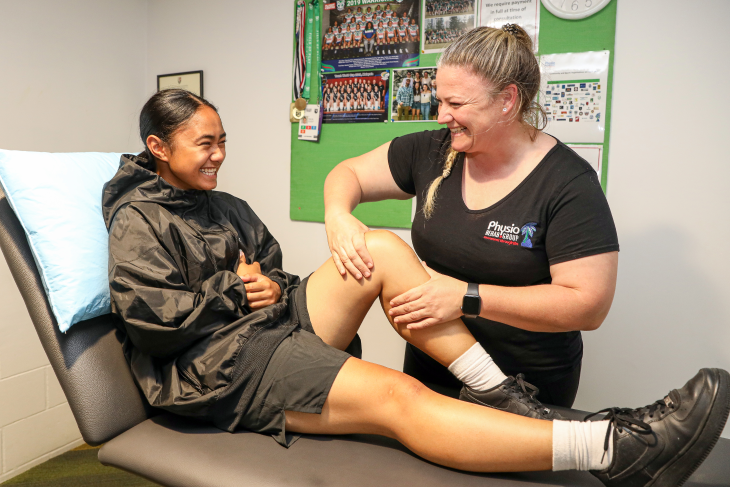
A young football player from South Auckland is now back on the field after becoming the latest success story of the Escalated Care Pathway, an innovative new injury management option.
Teenage footballer Carla Ma’amu Hunt is on the attack.
Bearing down on goal, Carla is about to unleash one of her fierce shots when she feels a hit from behind. A sharp pain springs up from her knee as she falls to the ground.
Carla makes her way off the field and her knee immediately puffs up. She doesn’t think much of it though – the sports-mad youngster is used to getting the odd knock from a heavy tackle.
Little does she know it will be different this time.
She will soon find out she has suffered a ruptured Anterior Cruciate Ligament (ACL) and will need months of rehabilitation after reconstructive surgery.
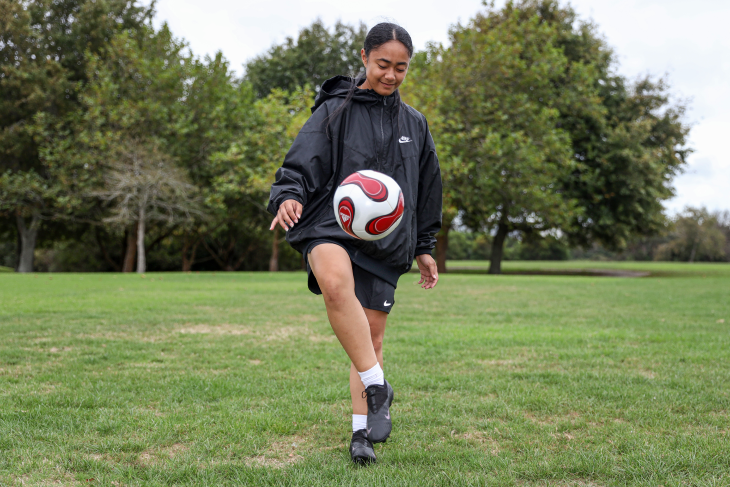
Carla is far from alone. There has been a 120% increase in the number of 15 to 19-year-old girls having ACL reconstruction surgery over the last ten years.
Luckily for Carla and many other New Zealanders who hurt themselves on the sports field, ACC was there to lend a helping hand.
A smoother road to recovery
The Escalated Care Pathway (ECP) was introduced by ACC for a four-year pilot phase in 2019 and benefits people with more complex injuries by providing a smoother, simpler and faster recovery journey. This includes regular milestones to ensure the patient’s recovery is on track.
Carla met the criteria to be referred to an orthopaedic surgeon who was part of Careway, one of five consortia delivering the ECP programme.
Consortia are a formal collection of different health specialists, such as GPs, physios, surgeons and others involved in treating complex musculoskeletal injuries.
After initially going to see her GP when her knee failed to come right, Carla was referred to Mark Clatworthy, a highly experienced orthopaedic knee surgeon based in Auckland.
Trained in New Zealand, Mark worked under leading knee surgeons in the USA, Canada, UK and Australia before returning home 21 years ago.
Having treated over 25,000 patients with knee problems, Mark knew exactly what was required to get Carla back to action and felt the ECP programme would be ideal.
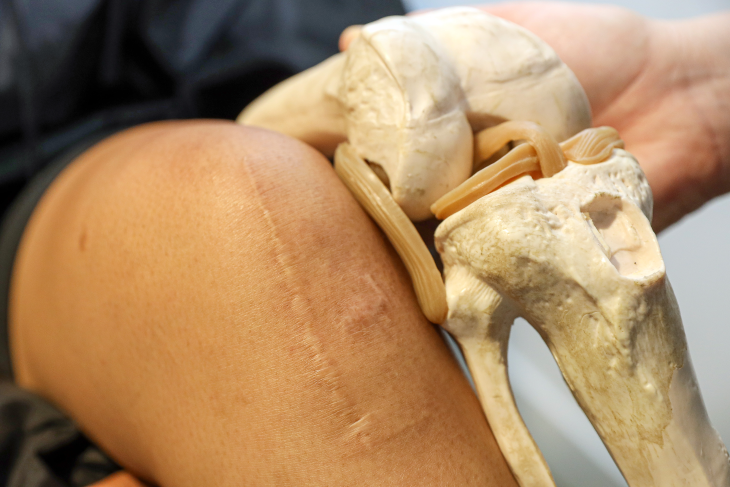
A real success story
As part of the Careway pathway, Mark worked closely with Sarah Fanuatanu, a physiotherapist at Physio Rehab Group, to get Carla ready for surgery and then help her recover.
“The programme has been a great success story for Carla,” Mark says.
“She first came to me with a very stiff, swollen and unstable knee. Careway enabled Carla to see Sarah very quickly with no surcharge,” he explains.
“She was then placed on the Careway ACL pre-habilitation programme to ensure her knee was in optimal condition for surgery. Sarah did a wonderful job to restore full motion and pre-injury strength to Carla’s knee so she could proceed with her surgery four weeks later.
“Despite the covid lockdowns, she was able to continue her rehab programme with Sarah to enable her to have a strong, stable knee to return to sport.”
Carla completed her sporting comeback in triumphant fashion earlier this year, finishing first in the 100m and second in the 200m at her school athletics, as well as being selected for a cricket team to tour Australia.
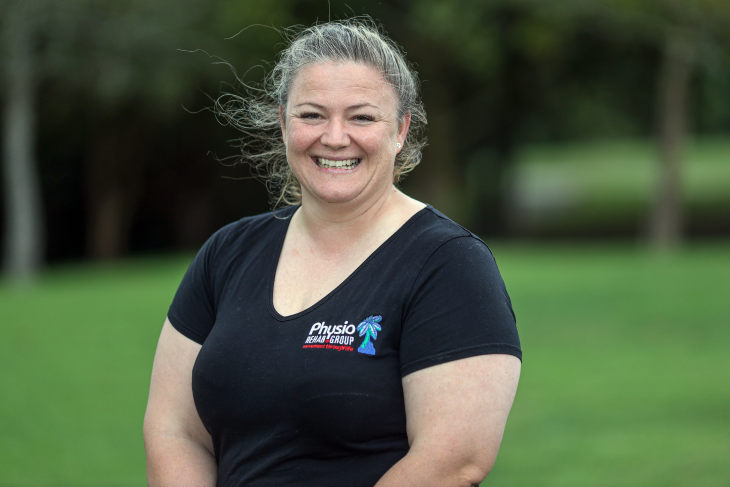
Sarah Fanuatanu, Carla's physio
Wrapping support around the patient
As highlighted with Carla’s case, the ECP service wraps a team of health professionals around an injured client, who all work together to provide the right type of treatment, at the right time.
ECP promotes equity of access by fully funding co-payments for treatment, thus removing financial barriers and making treatment even more accessible.
It also supports Māori and Pasifika patients to stay engaged in the pathway through a ‘navigator’ model.
The role of the navigator differs between consortia but is generally someone who helps a client with queries about their treatment and understanding the options available to them, helping to increase the client’s confidence.
They can also assist with tasks like booking appointments, organising transport and advocating on behalf of the client.
Carla’s physio Sarah believes this support and the removal of financial barriers are among the most important aspects of ECP.
Removing the financial burden
Sarah, manager of Pasifika Physio and a senior physiotherapist with the Physio Rehab Group, has worked in Otara for the entirety of her two-decade career and has seen a worryingly familiar pattern in lower socio-economic areas.
“Physio just isn’t the first priority,” she explains.
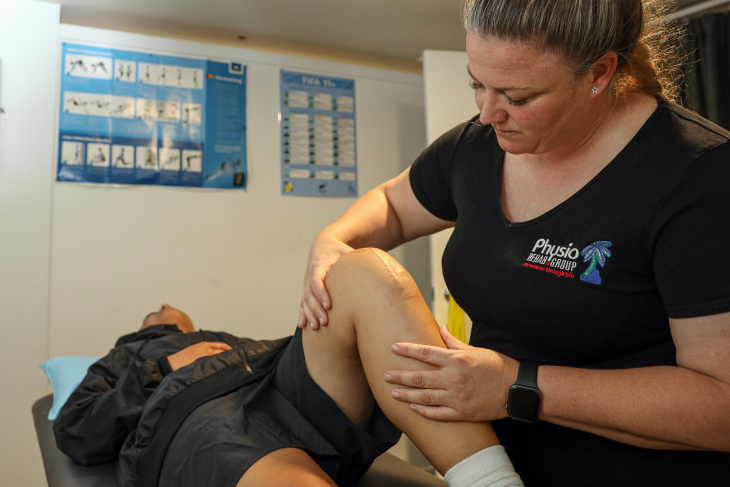
“We see it all the time where someone might come in for the first couple of sessions but, if they have to pay for a lot of physio for a long-term injury like this, they can then just fall off the radar. People might be struggling to put food on the table so they just can’t afford it, especially if it’s a young one in the family,” Sarah adds.
“So it was just about providing no barriers for Carla to come in, so she could literally just turn up and focus on her rehab – not having any concerns about the cost of treatment or gym membership.”
Ticking off the goals
Her recovery was still mentally draining at times though and Carla was grateful for the supportive powers of Sarah, who made sure to establish a personal relationship with the James Cook High School student.
“My husband is also Samoan so I could relate to her and her family quite well, which was good. I said some cheeky things to her in Samoan and made her laugh,” Sarah says with a chuckle.
“When I first met Carla, the injury was quite bad and I could tell straight away she had lost her confidence – she was walking with a bent knee and not able to straighten the leg very well. So she needed a lot of reassurance and just taking it step-by-step and giving her some little goals to work on and ticking those off first.”
And her rehabilitation period did bring an unexpected benefit.
“It was good for me in a way because I got to relax and didn’t have to do any chores – I got the special treatment at home,” Carla laughs.
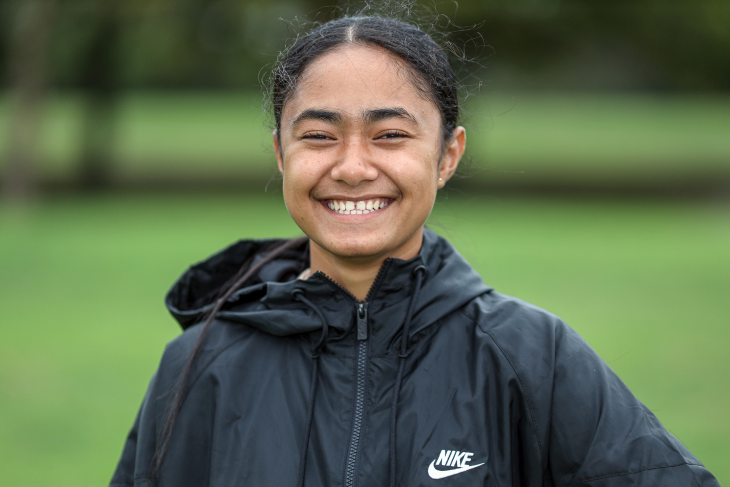
Staying on track with ECP
The structure provided by the ECP programme helped Carla stay focused during her toughest times.
“It was hard, I lost motivation and didn’t want to do anything at one point, I just wanted to lie in bed,” she admits.
“But then Sarah kept messaging me to do my exercises and that really helped – otherwise I would’ve just been sitting around and might never have returned to sport.”
Sarah feels the open communication between surgeon and physio, coupled with the guidelines for recovery laid out by ECP, are major benefits of the programme.
“If we’ve got any queries or concerns, like if the person’s scar looks like it might be infected, then we can just send them a message and get onto that ASAP. And if they’re not meeting their outcome measures or where they should be at different milestones then we can let them know straight away as well,” she says.
“There’s also some criteria set out for us to follow, which is probably really beneficial for physios who may not be as familiar with ACL reconstructive surgery and what the recovery involves. I’ve worked in sport for a long time but, for others, having a bit more of a structured programme and having to meet those outcome measures would be great.”
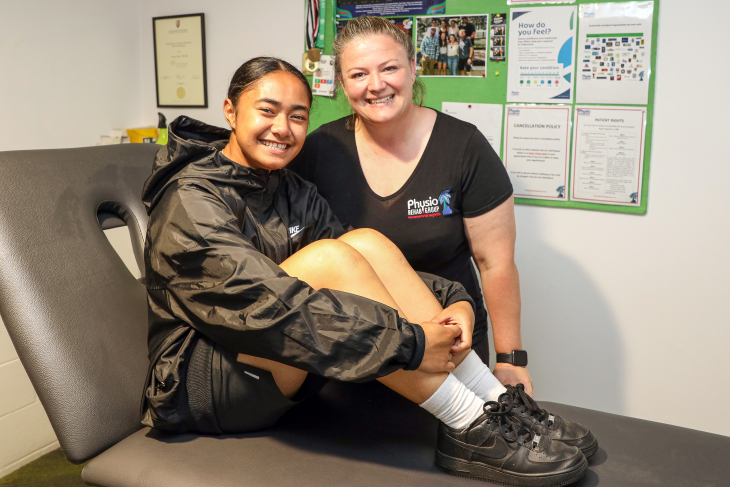
Working closely with our providers
Most aspects of the ECP service were designed in partnership by ACC and groups of providers – an example of ACC’s Health Sector Strategy in action. The aim of this strategy is for ACC to improve patients’ outcomes through closer collaboration with its providers.
“From the data we’ve seen out of the ECP pilot, we know the model is helping people get better faster,” says John Robson, ACC’s Chief Clinical Officer.
“Stories like Carla’s are what we come to work every day to do here at ACC and we know there are many more out there,” he adds.
“Through these new ways of working like ECP, we’re going to learn, grow and innovate. We want to put the patient at the centre of everything we do. And how we’re going to do that is in collaboration with our providers.”
Carla is now excited to return to the football pitch this season – and mum is happy she is now able to help out around the house again with the chores.
“We’re really grateful to ACC and everyone who has helped us, I wouldn’t have been able to come this far without that support,” Carla says.
Helping more New Zealanders through ECP
The Escalated Care Pathway is currently available to eligible patients in certain regions with more complex injuries.
Following the end of the pilot phase in 2023, it is planned for the pathway model to expand to more New Zealanders.
The five consortia that currently deliver the ECP programme are Careway, Active+ ECP, SpineCare Escalated Care Pathway, South Island Collaborative Care Pathway and RESS Knee Escalated Care Pathway.
To find out if you are eligible for ECP treatment, please talk to your GP.
More information on the Escalated Care Pathway (ECP) is available on the ACC website.
Innovative treatment pathways for injured New Zealanders
